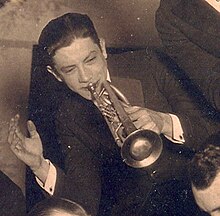Emmett Hardy
| Emmett Hardy | |
|---|---|

Hardy performing with The Carlisle Evans Band in 1921
|
|
| Background information | |
| Birth name | Emmett Louis Hardy |
| Born | June 12, 1903 |
| Origin |
|
| Died | June 16, 1925 (aged 22) |
| Genres | Jazz |
| Occupation(s) | Cornettist |
| Instruments | Cornet |
| Associated acts | New Orleans Rhythm Kings |
Emmett Louis Hardy (June 12, 1903 – June 16, 1925) was an early jazz cornet player and one of the best-regarded New Orleans musicians of his generation.
Emmett Louis Hardy was born in the New Orleans suburb of Gretna, Louisiana, and lived much of his life in the Algiers neighborhood on the west bank of New Orleans. Hardy was a child prodigy, described as already playing marvelously in his early teens. Some New Orleans musicians remembered as a musical highlight of their lives a 1919 cutting contest where, after long and intense struggle, Hardy succeeded in outplaying Louis Armstrong. (It is likely that Armstrong, although 2 years older than Hardy, had not yet hit his full stride at that time.)
Emmett Hardy was in the original incarnation of the New Orleans Rhythm Kings (or NORK) under the direction of Bee Palmer. For a time during its Friar's Inn residency the NORK used a two-cornet format -- Paul Mares, leader and first cornet, and Emmett Hardy as second. (Note that, as with other New Orleans jazz bands of that time (such as King Oliver's Creole Jazz Band and The Original Tuxedo Orchestra), the more creative player played the second part, with the first cornet staying closer to the lead line. Hardy did not appear on any of the Rhythm Kings recording sessions, never making any commercial recordings before his early death.
Back in New Orleans Hardy lead his own band and played in the band of Norman Brownlee.
Hardy's playing is described as being more lyrical than many of his New Orleans contemporaries, but with a driving rhythm. His tone was much admired. Hardy was an important influence on Bix Beiderbecke; Monk Hazel said that Bix on the Wolverines records sounds very much like Hardy.
Hardy also did metal work, made his own mouthpieces for his horn, and modified his cornet to add an additional spit-valve.
A relative remembered Hardy as being somewhat shy and unassuming, with a good dry sense of humor; that he was easily frightened by sudden loud noises, and superstitious about passing by graveyards.
...
Wikipedia
